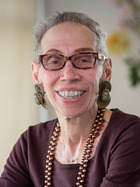
I have always considered myself to be young at heart, so I saw my 60th birthday as just another reason to celebrate, and certainly not as anything to change my outlook on life. However, only a month later, when I was diagnosed with lung cancer, I was sure I would not live to enjoy 61.
My lung cancer was discovered in November 1997, during a routine examination with my long-time primary care physician. For five years, as part of my annual check-up, I had been receiving a chest X-ray. But this time, my doctor saw something peculiar. They ran a CT (computed tomography) scan–a non-invasive scan of the lungs and other organs–and performed a broncoscopy-a flexible, lighted tube used to examine the different branches of the airways.
I met with my physician immediately to discuss my options. While it took me some time to adjust to my sudden diagnosis, I learned that I did not have the luxury of time to worry about or control things. I had to learn how to live with cancer. Trusting my physician completely, I decided to let him do the worrying for me.
A few weeks later, I had surgery to remove my right, upper lobe. My oncologist felt it would be best to wait and see what happened following surgery, so it was more than a year before I started any chemotherapy regimens. There were so many new types of treatments, and I always told myself that if one combination did not work, another one would. In December 2000, after trying a few different regimens, I finally found success in an expanded access program for an experimental lung cancer therapy.
When I was going through chemotherapy (about a year after my initial diagnosis and lobectomy), I needed a support group because I was totally unprepared for what to expect. I joined a support group at CancerCare. The group members had gone through what I was so fearful of and explained what to expect and what not to be afraid of. People who have been there can understand where you’re coming from, so for me this was what I totally needed.
My treatment was a positive experience for everyone. The physicians and nurses were knowledgeable and compassionate. Soon, the words “no change” became the two best words in the English dictionary. Knowing that the tumors might never shrink, I found that things were easier to deal with if I kept busy and approached life as I always had: with a positive attitude. When I chose wigs, I would pick looks not at all like my own hairstyle to make it fun rather than scary.
I received a great deal of support from my wonderful network of friends. They drove me to the grocery store, took me to my cancer support group, and made sure I got to the hospital for my treatment. Looking back, I can see that their support was vital to my recovery.
Once I started to get my energy back, I began volunteering a few days a week at CancerCare. I am able to enjoy my theater club, go out to dinner, and see movies with friends. I have not allowed lung cancer to be a death sentence, and I learned that a positive attitude can beat even the most devastating diseases. I still use CancerCare services for individual counseling when I get a scan that shows some tumor growth and/or I need additional treatment and I get nervous about it.
